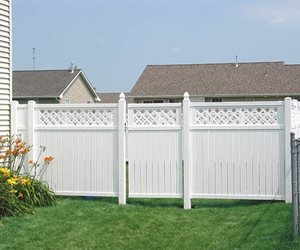Vinyl & Composite Fencing
Pros, cons and design ideas for synthetic fences
Vinyl fences are available in many different styles. This one is a privacy fence with a lattice top. The Fence, Deck & Patio Company in Houston, TX.
There are two types of synthetic fencing materials to choose from: vinyl and composite. Both options are appealing because they require very little maintenance.
Vinyl Fencing
| Pros | Cons |
|---|---|
| Virtually maintenance free | More expensive than wood |
| Never need painting | Extreme temperatures can damage vinyl |
| Won't split, crack or splinter | Color options are limited and may fade |
| Can be cleaned by spraying with a hose | Repairs can be difficult |
| Immune to insects and rot | May have mildew problems |
Vinyl fencing is made of PVC plastic. Typically, vinyl fences come in un-textured panels; however, some companies offer products that mimic stone or wood. Most manufacturers offer their fences in white or tan. Vinyl fences come in variety of styles including privacy, picket, post and rail and pool fencing. Check with fence distributors to see if matching gates, pergolas and arbors are available.
Composite Fencing
| Pros | Cons |
|---|---|
| Low maintenance | Weather may cause shrinking or expansion |
| Less likely to rot | Color may fade |
| Wide variety of colors and textures | More expensive than wood |
| Looks more like wood than vinyl | Can develop mold |
| Often comes with a 20+ year warranty | May stain |
| Often made of recycled materials |
Composite fencing is made of a combination of plastic and wood fibers. Depending on the company composite fencing is available in individual boards or panels. Virtually any fence style that can be created with wood can also be created with composite materials, including privacy fences and good neighbor fences.
Related:
Wood
Wrought Iron

 Backyards
Backyards
 Front Yards
Front Yards


